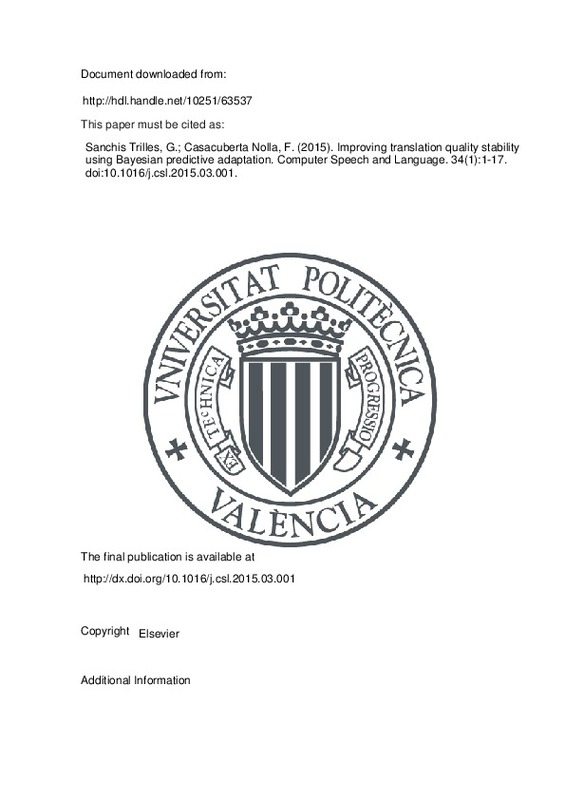JavaScript is disabled for your browser. Some features of this site may not work without it.
Buscar en RiuNet
Listar
Mi cuenta
Estadísticas
Ayuda RiuNet
Admin. UPV
Improving translation quality stability using Bayesian predictive adaptation
Mostrar el registro sencillo del ítem
Ficheros en el ítem
| dc.contributor.author | Sanchis Trilles, Germán
|
es_ES |
| dc.contributor.author | Casacuberta Nolla, Francisco
|
es_ES |
| dc.date.accessioned | 2016-05-04T11:18:33Z | |
| dc.date.available | 2016-05-04T11:18:33Z | |
| dc.date.issued | 2015-11 | |
| dc.identifier.issn | 0885-2308 | |
| dc.identifier.uri | http://hdl.handle.net/10251/63537 | |
| dc.description.abstract | [EN] We introduce a Bayesian approach for the adaptation of the log-linear weights present in state-of-the-art statistical machine translation systems. Typically, these weights are estimated by optimising a given translation quality criterion, taking only into account a certain set of development data (e.g., the adaptation data). In this article, we show that the Bayesian framework provides appropriate estimates of such weights in conditions where adaptation data is scarce. The theoretical framework is presented, alongside with a thorough experimentation and comparison with other weight estimation methods. We provide a comparison of different sampling strategies, including an effective heuristic strategy and a theoretically sound Markov chain Monte-Carlo algorithm. Experimental results show that Bayesian predictive adaptation (BPA) outperforms the re-estimation from scratch in conditions where adaptation data is scarce. Further analysis reveals that the improvements obtained are due to the greater stability of the estimation procedure. In addition, the proposed BPA framework has a much lower computational cost than raw re-estimation. © 2015 Elsevier Ltd. All rights reserved. | es_ES |
| dc.description.sponsorship | The research leading to these results has received funding from the European Union Seventh Framework Programme (FP7/2007-2013) under grant agreement Nr. 287576 (CasMaCat). Also funded by the Generalitat Valenciana under grant Prometeo/2009/014. | en_EN |
| dc.language | Inglés | es_ES |
| dc.publisher | Elsevier | es_ES |
| dc.relation.ispartof | Computer Speech and Language | es_ES |
| dc.rights | Reserva de todos los derechos | es_ES |
| dc.subject | Bayesian method | es_ES |
| dc.subject | Adaptation | es_ES |
| dc.subject | Natural language processing | es_ES |
| dc.subject | Machine translation | es_ES |
| dc.subject.classification | LENGUAJES Y SISTEMAS INFORMATICOS | es_ES |
| dc.title | Improving translation quality stability using Bayesian predictive adaptation | es_ES |
| dc.type | Artículo | es_ES |
| dc.identifier.doi | 10.1016/j.csl.2015.03.001 | |
| dc.relation.projectID | info:eu-repo/grantAgreement/Generalitat Valenciana//PROMETEO09%2F2009%2F014/ES/Adaptive learning and multimodality in pattern recognition (Almapater)/ | |
| dc.relation.projectID | info:eu-repo/grantAgreement/EC/FP7/287576/EU/Cognitive Analysis and Statistical Methods for Advanced Computer Aided Translation/ | |
| dc.rights.accessRights | Abierto | es_ES |
| dc.contributor.affiliation | Universitat Politècnica de València. Departamento de Sistemas Informáticos y Computación - Departament de Sistemes Informàtics i Computació | es_ES |
| dc.description.bibliographicCitation | Sanchis Trilles, G.; Casacuberta Nolla, F. (2015). Improving translation quality stability using Bayesian predictive adaptation. Computer Speech and Language. 34(1):1-17. https://doi.org/10.1016/j.csl.2015.03.001 | es_ES |
| dc.description.accrualMethod | S | es_ES |
| dc.relation.publisherversion | http://dx.doi.org/10.1016/j.csl.2015.03.001 | es_ES |
| dc.description.upvformatpinicio | 1 | es_ES |
| dc.description.upvformatpfin | 17 | es_ES |
| dc.type.version | info:eu-repo/semantics/publishedVersion | es_ES |
| dc.description.volume | 34 | es_ES |
| dc.description.issue | 1 | es_ES |
| dc.relation.senia | 283752 | es_ES |
| dc.contributor.funder | Generalitat Valenciana | |
| dc.contributor.funder | European Commission |







![[Cerrado]](/themes/UPV/images/candado.png)

